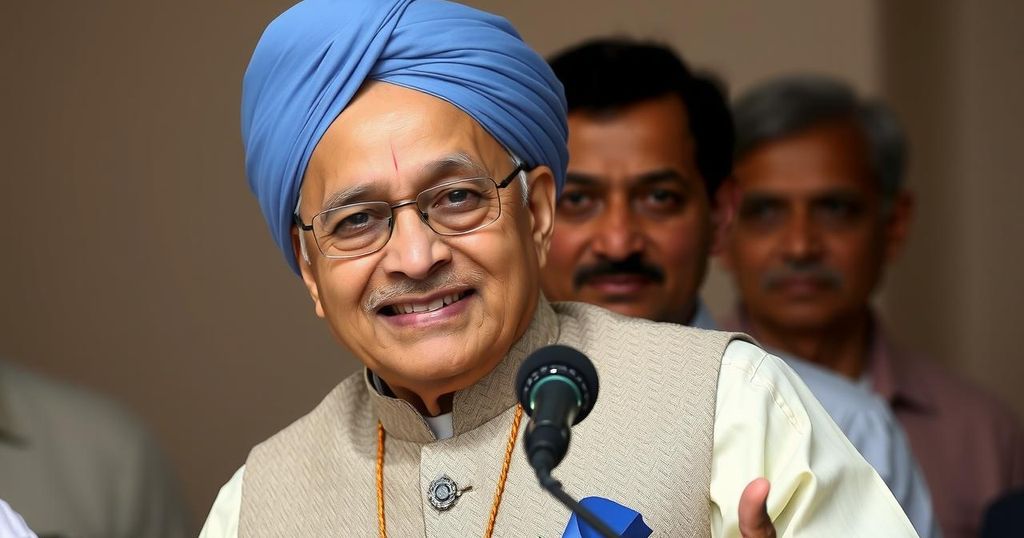Manmohan Singh, former Prime Minister of India, died at the age of 92. He was known for his role as architect of economic reforms during his tenure from 2004 to 2014. Despite facing corruption controversies that impacted his administration, Singh played a vital role in significantly transforming India’s economy and international relations. He is remembered for his integrity and commitment to governance while navigating the complexities of politics in a diverse democracy.
Manmohan Singh, the former Prime Minister of India and a pivotal figure in the nation’s economic reform, has passed away at the age of 92. Singh served as India’s Prime Minister from 2004 to 2014 and was renowned for his role as Finance Minister during the 1991 economic liberalization. His leadership not only marked notable advancements in economic policy but also bore the weight of political controversies that stained his administration’s legacy. Singh was the first Sikh to hold the prime ministerial office and the first leader since Jawaharlal Nehru to serve consecutive terms.
Born on September 26, 1932, in a remote Punjab village with limited resources, Singh overcame significant challenges in his early life, pursuing education at Panjab University, Cambridge University, and Oxford University. His academic prowess led to a distinguished career as a civil servant and economist before he entered mainstream politics as India’s Finance Minister, spearheading economic reforms that catalyzed growth and development in the early 1990s.
Despite being perceived as a capable administrator, Singh’s tenure was not devoid of challenges. His time in office was marked by corruption scandals that ultimately contributed to the Congress party’s electoral defeats. Critics often labeled him as the “accidental prime minister,” suggesting that he wielded limited power, particularly during his initial years when Sonia Gandhi, Congress president, was seen as the real decision-maker.
Singh’s notable achievements include bringing India out of nuclear isolation through a landmark fissile material agreement with the United States, as well as maintaining a pragmatic approach toward foreign relations, including the peace process with Pakistan and enhanced ties with Afghanistan. Despite his successful policies, his second term was characterized by policy paralysis and significant corruption allegations against his government, leading to a decline in support.
In retirement, Singh remained an influential voice within the Congress party, often advising on economic matters. His insights during the COVID-19 pandemic emphasized the need for immediate action to address economic downturns. As a man of few words, he was known for his calm demeanor and intellectual approach, fostering respect among colleagues and constituents.
Singh will be remembered for his significant role in transforming India’s economy and international standing, while his journey reflects the complexities of political leadership in a diverse democracy. He is survived by his wife and three daughters.
Manmohan Singh’s life and career symbolize the trajectory of modern India, particularly in the context of its economic reform journey. His emergence as a central political figure coincided with a critical period of financial turmoil in India, demanding innovative leadership and risk-taking to guide the country toward a market-oriented economy. Singh’s academic achievements provided him with a strong foundation in economic theory and practice, allowing him to implement groundbreaking reforms that reshaped India’s economic landscape. However, his political career was also marred by controversies, illustrating the challenges faced by leaders when navigating the intersection of governance and public expectation in a democratic setup.
In conclusion, Manmohan Singh’s legacy as an economic reformer and political leader is profound, characterized by significant accomplishments tempered by political challenges. His leadership not only transformed India’s economic policies but also brought forth a discourse on the responsibilities and complexities of governance. Although his later years in office were overshadowed by controversies, Singh’s contributions to India’s position on the global stage and his calm, integrity-filled demeanor will be remembered. He leaves behind a legacy that is both influential and instructive for future generations of leaders.
Original Source: www.bbc.com






